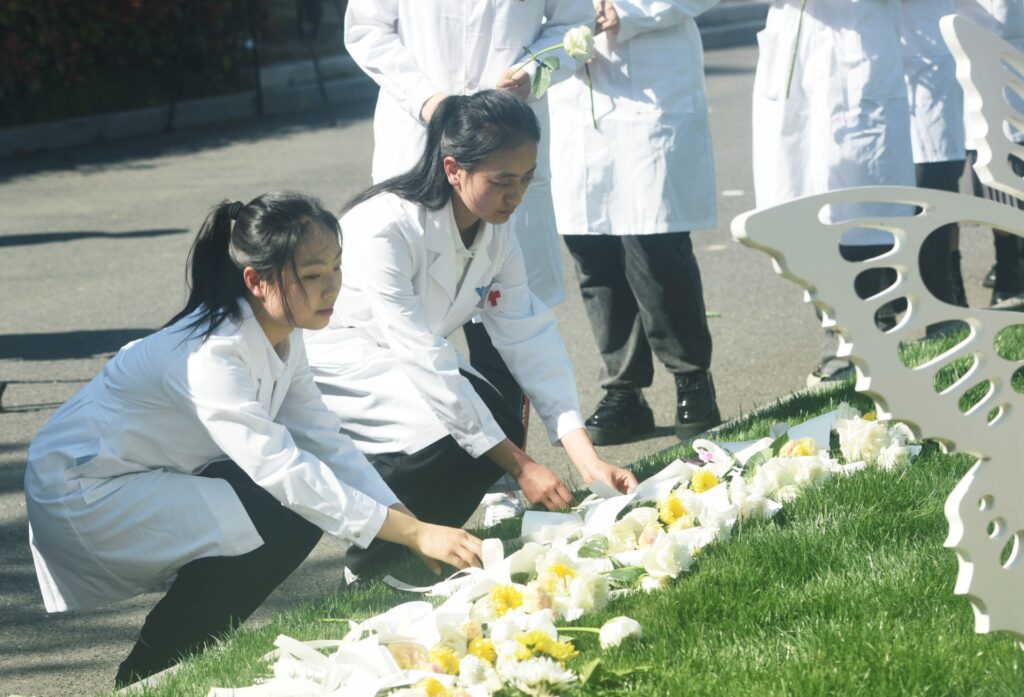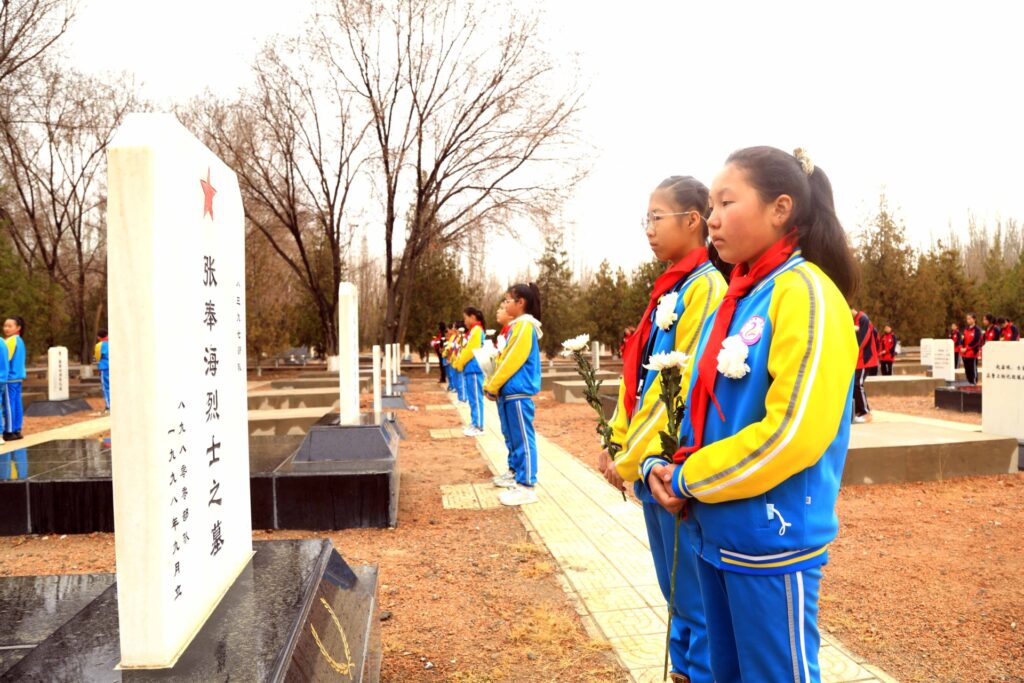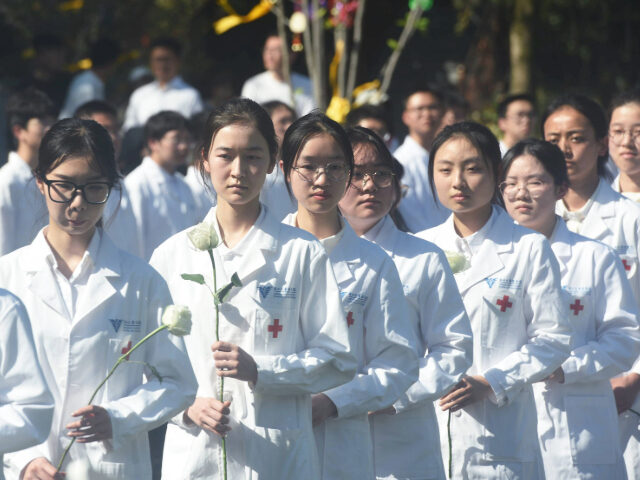The Chinese state newspaper Global Times celebrated the Communist Party on Sunday for hosting a “national commemoration event for human organ donation,” giving Beijing’s organ industry a veneer of legitimacy as evidence has mounted for years that the Party kills political prisoners to sell their bodies.
Journalists, human rights activists, and eyewitnesses — including one doctor who claims to have extracted the organs out of a live and healthy political prisoner — have long accused the Communist Party of killing political prisoners on demand to sell their organs to individuals willing to pay for the ability to schedule transplants rapidly. Chinese officials reportedly target Falun Gong practitioners, known to abstain from drugs and alcohol, and Uyghur Muslims, whose organs can be sold to wealthy Muslims in the Middle East, most often, potentially killing thousands of people each year.
At a hearing in Congress in late March, one of the top researchers on the topic, Ethan Gutmann, told American lawmakers that China appears to be, based on discrepancies in the government documentation of organ transplants, killing as many as 50,000 Uyghur people a year to steal their organs. China is currently engaging in what the free world widely recognizes as a genocide against Uyghurs and other Turkic ethnic groups in occupied East Turkistan, placing millions in concentration camps and subjecting them to indoctrination, slavery, forced sterilization, and other atrocities.
RELATED — Chinese Concentration Camp Survivor: I Saw People Tortured for Denying Xi Jinping Is God
Matt Perdie / Breitbart NewsThe Chinese government insists that its booming organ transplant industry grew legitimately, and all organs are donated voluntarily. It has increasingly hosted events to boast its gigantic organ transplant industry. In December, for example, China hosted two events on “organ donation” associated with its Belt and Road Initiative (BRI), China’s global plan to use predatory loans to influence poor nations.
In its report on Sunday, the Global Times claimed that 6.7 million people in the country have registered to donate their organs in the event of an untimely death and that many enthusiastically participated in memorial services on Saturday for organ donors.
“On Saturday afternoon, a memorial event for organ donors was held at a cemetery in the outskirts of Hangzhou. After some donors were given eco-burials on site, attendees presented flower baskets to them and offered condolences to their families,” the state propaganda outlet detailed. The next day, a separate event used “storytelling, stage plays, recitations, and song and dance” to share “the touching stories and the spirit of great love of organ donors and their families, organ transplant recipients, organ donation coordinators, medical personnel and Red Cross workers and volunteers.”

Medical students from Zhejiang University are presenting flowers to donors of human organs (remains and tissues) at the Zhejiang Red Cross ”Life Respect Garden” in Qianjiang Cemetery in Hangzhou, Zhejiang Province, China, on March 30, 2024. (Costfoto/NurPhoto via Getty Images)
The events were scheduled to coincide with the upcoming Qingming Festival, or “Tomb-Sweeping Day,” in which many in China visit the tombs of their loved ones, clean them, and leave offerings to honor the dead.
“In China, the Qingming Festival and the days before the festival are a time for beneficiaries and people from all walks of life to remember organ donors,” the Global Times explained. “Over the past few days, various provinces such as Jiangsu in East China, Hainan in South China, Sichuan and Chongqing in Southwest China, and Hebei in North China, have organized local memorial ceremonies.”

Primary and middle school students visit the mausoleum of Malan Revolutionary Martyrs for Tomb-Sweeping Day in Bazhou, Xinjiang province, China, on April 1, 2024. (Photo by Costfoto/NurPhoto via Getty Images)
The state newspaper also noted that Beijing is anticipating the implementation of a law passed in December that would streamline organ “donation” and transplants. The Communist Party law focuses on enthusiastic “publicity of organ donation” to convince more Chinese people to sign up to be donors” and “provisions on organ procurement and distribution … making the entire process more transparent and fair.”
China has faced years of suspicions that it is killing political prisoners to sell their organs.
“Beginning in 2000 … Transplant waiting times went from many months to just weeks, days, and sometimes hours,” researcher Matthew Robertson told the Congressional-Executive Commission on China (CECC) at the hearing in March. “Organ transplantation went from a specialized therapy catering primarily to Party cadres to a routine treatment available country-wide.”
Robertson said that Beijing hosts “a state-sponsored marketplace for human organs in China, with prices openly advertised on hospital websites and substantial price disparities between foreign and domestic patients.” The websites do not explain how it is possible, in a system that claims only to use voluntarily donated organs, for the hospitals to rapidly procure human organs on demand.
A 2022 study from the Australian National University (ANU) concluded that evidence extracted from China’s organ transplant system indicated that Beijing was turning surgeons into “executioners,” citing “problematic declarations of brain death” in which the direct cause of many prisoners whose organs were transplanted appeared to be doctors cutting up their bodies.
“The leader of China’s transplant sector wrote in 2007 that effectively 95% of all organ transplants were from prisoners,” the researchers observed. In many cases, it noted, “given that the donors could not have been brain dead before organ procurement, the declaration of brain death could not have been medically sound.”
The study observed the time period from 1980 to 2015.

COMMENTS
Please let us know if you're having issues with commenting.